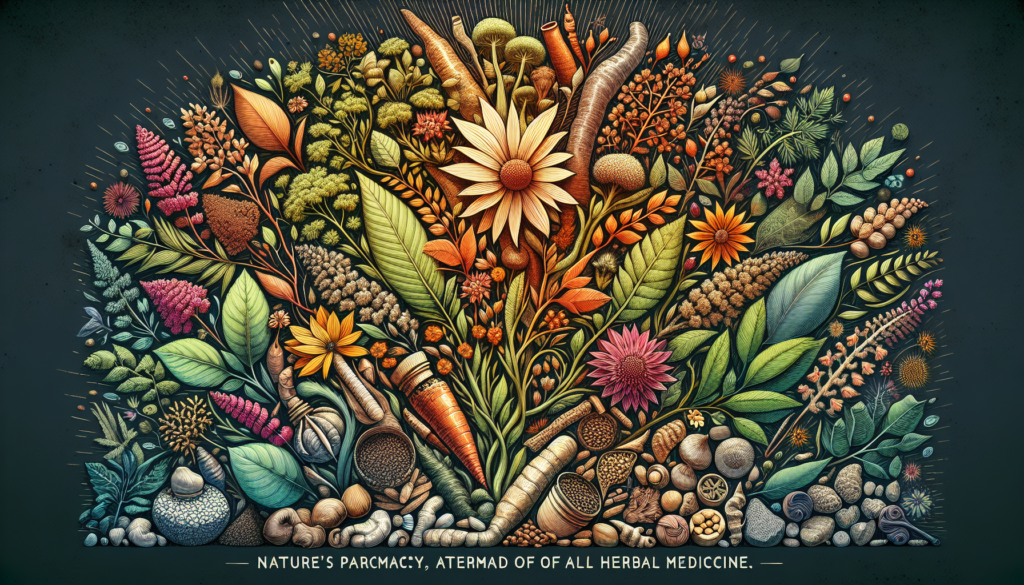So, you’re curious about herbal medicine and what category it falls into. Well, herbal medicine, also known as botanical medicine or phytomedicine, is a form of alternative medicine that uses plant extracts for medicinal purposes. It has been practiced for centuries and continues to gain popularity due to its perceived natural and holistic approach towards healing. From traditional remedies to modern concoctions, herbal medicine encompasses a wide range of practices and herbs, making it a truly diverse and fascinating field. Let’s explore further to unravel the intriguing world of herbal medicine and shed light on its classification.

Traditional Medicine
Traditional medicine refers to the use of various practices and remedies that have been passed down through generations within specific cultural or indigenous communities. These practices and remedies are often rooted in ancient belief systems and have been used for centuries to prevent and treat various illnesses and ailments.
Types of Traditional Medicine
There are several types of traditional medicine that have been practiced and honored by different cultures around the world. Some of the most well-known types include herbal medicine, traditional Chinese medicine, Ayurvedic medicine, Native American medicine, and Western herbal medicine. Each type has its own unique principles, methods, and herbs used for healing purposes.
Herbal Medicine
Definition
Herbal medicine, also known as herbalism, is a type of traditional medicine that relies on the use of plants and plant extracts to promote health and treat illnesses. It is one of the oldest forms of medicine and has been practiced for thousands of years.
History
The history of herbal medicine dates back to ancient times when people observed the healing properties of various plants and began using them for medicinal purposes. The use of herbs for healing can be found in ancient Egyptian, Greek, and Chinese texts, showcasing the widespread recognition and value of herbal medicine across different cultures.
Common Herbs Used in Herbal Medicine
Herbal medicine utilizes a wide range of plant species to create remedies for specific health conditions. Some common herbs used include echinacea for boosting the immune system, chamomile for relaxation and sleep, ginger for digestion, and ginkgo biloba for cognitive function. These herbs are often consumed as teas, tinctures, capsules, or applied topically.
Traditional Chinese Medicine
Principles of Traditional Chinese Medicine
Traditional Chinese medicine (TCM) is a comprehensive system of medicine that has been practiced for over 2,500 years. It is based on the belief that the body’s vital energy, known as Qi, flows through meridians or channels, and any imbalance or blockage in this energy can lead to illness. TCM seeks to restore balance and harmony within the body.
Herbs Used in Traditional Chinese Medicine
TCM utilizes a vast array of herbs in their remedies. Some commonly used herbs include ginseng for energy and vitality, astragalus for immune support, and licorice root for soothing the digestive system. These herbs are often combined in formulas designed to address specific patterns of disharmony within the body.
Treatment Methods in Traditional Chinese Medicine
In addition to herbal remedies, TCM incorporates other treatment methods such as acupuncture, cupping, and tai chi. Acupuncture involves the insertion of thin needles into specific points along the body’s meridians to restore balance and promote healing. Cupping uses suction cups to stimulate blood flow and relieve muscle tension, while tai chi combines gentle movements and deep breathing to improve energy flow and promote overall health.

Ayurvedic Medicine
Principles of Ayurvedic Medicine
Ayurvedic medicine originated in India over 5,000 years ago and is based on the belief that the body, mind, and spirit are interconnected and must be balanced for optimal health. It focuses on individualized treatment plans based on a person’s unique constitution, or dosha, which is determined by their physical and emotional characteristics.
Herbs Used in Ayurvedic Medicine
Ayurvedic medicine utilizes a wide range of herbs and botanicals to restore balance and promote wellbeing. Some commonly used herbs include ashwagandha for stress management, turmeric for its anti-inflammatory properties, and triphala for digestive support. These herbs are often prepared as powders, capsules, or teas.
Treatment Methods in Ayurvedic Medicine
In addition to herbal remedies, Ayurvedic medicine incorporates various treatment methods such as yoga, massage, and meditation. Yoga combines physical postures, breath control, and meditation to promote balance and harmony in the body and mind. Massage, known as Abhyanga, involves the use of warm oils and specific strokes to improve circulation and stimulate the body’s natural healing abilities.
Native American Medicine
Principles of Native American Medicine
Native American medicine is deeply rooted in the spirituality and connection to the natural world. It recognizes the interconnectedness of all living beings and places a strong emphasis on healing the mind, body, and spirit as a whole. Native American medicine often involves ceremonies, rituals, and the use of sacred herbs.
Herbs Used in Native American Medicine
The use of medicinal plants is an essential aspect of Native American medicine. Some commonly used herbs include sage for cleansing and purification, sweetgrass for attracting positive energy, and cedar for protection and grounding. These herbs are often burned as smudge sticks or used in teas and poultices.
Treatment Methods in Native American Medicine
Native American medicine utilizes various treatment methods, including rituals, ceremonies, and spiritual practices. Sweat lodge ceremonies, vision quests, and healing dances are all examples of traditional Native American healing practices. These ceremonies aim to restore balance and harmony within the individual and community.
Western Herbal Medicine
Principles of Western Herbal Medicine
Western herbal medicine, also known as phytotherapy, is a modern approach to herbal medicine that combines traditional knowledge with scientific research. It emphasizes the use of medicinal plants to support the body’s natural healing processes and treat specific health conditions.
Herbs Used in Western Herbal Medicine
Western herbal medicine draws upon the traditional use of herbs while incorporating scientific research and evidence. Some commonly used herbs include St. John’s wort for depression, milk thistle for liver health, and valerian root for sleep support. These herbs are often formulated into standardized extracts or compounded preparations.
Treatment Methods in Western Herbal Medicine
In addition to herbal remedies, Western herbal medicine may also incorporate lifestyle modifications, dietary recommendations, and other complementary therapies. It takes a holistic approach to health, considering factors such as nutrition, exercise, stress management, and environmental influences.
Categories of Herbal Medicine
Herbal medicine can be categorized into different forms based on how the herbs are used and prepared. These categories include medicinal herbs, dietary supplements, herbal extracts, herbal teas, and topical herbal preparations.
Medicinal Herbs
Medicinal herbs are the raw plant materials used in herbal medicine. They can be sourced from various parts of the plants, such as leaves, flowers, roots, or bark. These herbs are often prepared as teas, infusions, decoctions, tinctures, or capsules.
Dietary Supplements
Herbal dietary supplements are concentrated forms of herbs that are formulated into tablets, capsules, or powders. They are often used to supplement the diet and provide specific health benefits. These supplements may contain one or multiple herbs and are regulated by specific guidelines.
Herbal Extracts
Herbal extracts are concentrated forms of herbs that are obtained through processes such as distillation, maceration, or cold pressing. These extracts contain the active compounds of the herbs and are often used to create standardized preparations for consistent dosing.
Herbal Teas
Herbal teas, also known as herbal infusions, are made by steeping dried or fresh herbs in hot water. They are a popular and accessible way to consume medicinal plants and are often used for their therapeutic properties or as a soothing beverage.
Topical Herbal Preparations
Topical herbal preparations include creams, ointments, salves, and poultices that are applied externally to the skin. These preparations often contain herbs known for their anti-inflammatory, analgesic, or wound-healing properties and are used to address various skin conditions or provide localized relief.
Safety and Regulation
Safety of Herbal Medicine
While herbal medicine is generally considered safe, it is important to recognize that herbs contain active compounds that can interact with medications or cause adverse effects in certain individuals. It is recommended to consult with a qualified healthcare professional or herbalist before starting any herbal treatment, especially if you have pre-existing medical conditions or are taking medications.
Regulatory Bodies and Standards
The regulation of herbal medicine varies between countries and jurisdictions. In some countries, herbal remedies are regulated as dietary supplements, while in others, they may be regulated as over-the-counter drugs or traditional medicines. Regulatory bodies and standards aim to ensure the quality, safety, and efficacy of herbal products, including guidelines for manufacturing practices and labeling requirements.
Effectiveness and Research
Research on Herbal Medicine
There is a growing body of research surrounding the efficacy and safety of herbal medicine. Studies have focused on various herbs and their effects on specific health conditions, as well as the mechanisms of action and potential interactions with conventional medications. Research provides valuable insights into the therapeutic potential of herbal remedies.
Evidence-Based Practice in Herbal Medicine
Evidence-based practice in herbal medicine involves integrating scientific research, clinical experience, and patient preferences to inform treatment decisions. It emphasizes the use of high-quality research studies to support the effectiveness and safety of herbal interventions. This approach allows healthcare professionals and herbalists to make informed choices based on the best available evidence.
Conclusion
Herbal medicine encompasses a rich tapestry of traditional healing practices that have been passed down through generations. From ancient herbal remedies to modern scientific research, herbal medicine offers a diverse range of therapeutic options for promoting health and wellbeing. Whether it is traditional Chinese medicine, Ayurvedic medicine, or Native American medicine, the principles and methods of herbal medicine continue to play a significant role in various cultures worldwide, offering alternative approaches to healthcare for those seeking a holistic and natural path to wellness.





